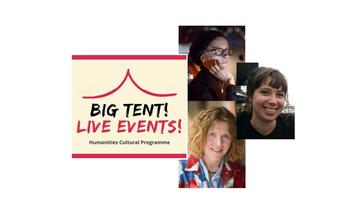Eco-theatre and the Anthropocene: Katie Mitchell in conversation
Watch our Big Tent! Live Event with Katie Mitchell, Dr Catherine Love and Professor Fiona Stafford on the TORCH Youtube channel here.
Humanities Cultural Programme Visiting Theatre Fellow Katie Mitchell was joined by ecodramaturgy expert Dr Catherine Love and ecocriticism expert Professor Fiona Stafford, for a discussion on the aspirations and practicalities of making environmental theatre.
Anthropocene, Eco-criticism, Ecodramaturgy
The session began by digging into three key terms:
- Professor Wes Williams, chair of the session, introduced the Anthropocene: ‘a time during which the planet has been radically altered by the presence of humans as a species’ and therefore a way of ‘thinking about our place as humans on the planet’.
- Professor Fiona Stafford brought in the field of ecocriticism, a way of reading texts that has been developing since the 1990s. with its basis in thinking about literature in relation to the environment and ecology. Ecocriticism has created a new focus when looking back at canonical texts, considering nature as it exists outside of its relationship to humans.
- Dr Catherine Love discussed her experience of ecodramaturgy, a new field thinking about how theatre might represent the environment in the Anthropocene. It involves focusing not only on theatrical content, but the material conditions surrounding theatre.
Challenges in ecodramaturgy
Dr Catherine Love outlined some of the challenges faced by theatre practitioners wanting to make environmental work:
- Time scale: most plays take place within human timescales, a contrast to natural timescales, where actions taken today can have consequences many generations into the future.
- Global context: theatre can struggle to depict the ‘connections between humans, natural resources and economics in a globalised context.’
- Is theatre inherently anthropocentric?: when depicting connections between humans and other species it can be difficult to ‘preserve the separateness’ of humans whilst conveying our ‘interdependency’ with other species.
Old projects, new projects
Katie Mitchell discussed her experience of making theatre focused on the climate crisis, from her first meeting with scientist Stephen Emmott through to an upcoming project which reimagines Checkov’s The Cherry Orchard from the tree’s perspective.
Past projects include
- 10 Billion: A lecture-style play in which Stephen Emmott highlighted key issues that we often ignore in our conversations around the climate crisis.
- Lungs: Mitchell’s production of the Duncan Macmillan play saw the two performers on static bicycles powering their own lighting. Additional performers used bicycles to power a population counter, giving a global scale to the decision the two characters were making: should they have a child in the midst of environmental collapse?
New projects include:
- No Travel: Katie Mitchell will rehearse this touring production via Zoom with local Swiss actors. When the play moves to a new city, a local director and cast will take over, reimagining the play to include elements that are particularly pertinent to the location of performance.
- The Cherry Orchard: Katie Mitchell’s future production of the classic Chekov play will be told from the perspective of the trees, running the action of the play backwards before moving even further into the trees' past, back to the carboniferous period.
Developing a ‘believing relationship to facts’
Threaded throughout the conversation was the idea that theatre might help develop a ‘believing relationship to the facts’ around climate change.
Katie Mitchell introduced the phrase, highlighting that ‘it’s your relationship to the facts which really needs looking at.’ With her first works on the climate crisis, Mitchell had tried to ‘translate some fo the complex science’ and ‘order it in such a way that it would be conceivable.’
Dr Catherine Love agreed, saying that ‘people don’t necessarily respond to more facts’, and that theatre’s role could be seen as providing ‘an imaginative leap,' allowing us to think through what it would mean to believe the facts of the climate crisis, and to develop our ability to reimagine our way of living and being.
Harnessing hope
Does environmental theatre have to be tragic? Dr Fiona Stafford advocated for the value of a more hopeful approach, arguing that the climate crisis is often seen as ‘too difficult and too big’ and can ‘often fill people with despair’.
Professor Wes Williams asked if an ecological play could ‘deal with disaster, but offer a dream of resolution’, to which Katie Mitchell responded that she was interested in developing ‘a kinder relationship between the audience and the subject matter.’
The conversation moved towards Rebecca Solnit’s conception of hope as something active, with Dr Catherine Love suggesting that hope could consist not of the belief that everything is fine, but as something that allows you to act.
If you want to hear further discussion of these ideas, watch the full event on the TORCH YouTube here.
Further links:
Katie Mitchell’s No Travel project



